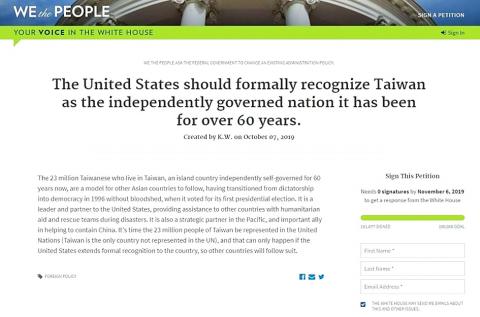An online petition launched by a US citizen calling on the US to formally recognize “Taiwan as [an] independently governed nation” yesterday passed the 100,000 signature threshold.
The petition, submitted to the White House Web site “We the People” on Monday last week by a person identified only as “K.W.,” argues that Taiwan could only join the UN if the US recognized its sovereignty and set an example for other nations.
The White House generally responds to petitions within 60 days of the threshold being reached, the Web site says.

Screen grab from the White House Web site
“However, depending on the topic and the overall volume of petitions from We the People, responses may be delayed,” it says.
The Ministry of Foreign Affairs yesterday acknowledged the petition and said it would continue to deepen its “friendly partnership” with the US.
The ministry respects the action by the petitioner, but reminds the public that launching White House petitions is a personal undertaking by US citizens, ministry spokeswoman Joanne Ou (歐江安) said.
The ministry would continue to monitor developments related to the petition and would continue to develop relations with the US through existing channels, she said.
This is not the first time a petition has been launched calling on a foreign government to recognize Taiwan.
Michael Kreuzberg on May 31 submitted a petition to the Bundestag asking the German government to establish diplomatic relations with Taiwan and on Sept. 11 posted the petition online to collect signatures.
The petition reached the 50,000 signature threshold by the deadline on Oct. 3 and the Bundestag is expected to put the issue on its agenda for debate.
In 2016, a petition calling on the British government to recognize Taiwan was launched on the UK government’s petition Web site.
While the petition reached the threshold to prompt a response from the British government, London at the time said the Taiwan issue requires dialogue across the Taiwan Strait to establish a consensus between people from the two sides.
Additional reporting by CNA

INVESTIGATION: The case is the latest instance of a DPP figure being implicated in an espionage network accused of allegedly leaking information to Chinese intelligence Democratic Progressive Party (DPP) member Ho Jen-chieh (何仁傑) was detained and held incommunicado yesterday on suspicion of spying for China during his tenure as assistant to then-minister of foreign affairs Joseph Wu (吳釗燮). The Taipei District Prosecutors’ Office said Ho was implicated during its investigation into alleged spying activities by former Presidential Office consultant Wu Shang-yu (吳尚雨). Prosecutors said there is reason to believe Ho breached the National Security Act (國家安全法) by leaking classified Ministry of Foreign Affairs information to Chinese intelligence. Following interrogation, prosecutors petitioned the Taipei District Court to detain Ho, citing concerns over potential collusion or tampering of evidence. The

‘FORM OF PROTEST’: The German Institute Taipei said it was ‘shocked’ to see Nazi symbolism used in connection with political aims as it condemned the incident Sung Chien-liang (宋建樑), who led efforts to recall Democratic Progressive Party (DPP) Legislator Lee Kun-cheng (李坤城), was released on bail of NT$80,000 yesterday amid an outcry over a Nazi armband he wore to questioning the night before. Sung arrived at the New Taipei City District Prosecutors’ Office for questioning in a recall petition forgery case on Tuesday night wearing a red armband bearing a swastika, carrying a copy of Adolf Hitler’s Mein Kampf and giving a Nazi salute. Sung left the building at 1:15am without the armband and apparently covering the book with a coat. This is a serious international scandal and Chinese

Seventy percent of middle and elementary schools now conduct English classes entirely in English, the Ministry of Education said, as it encourages schools nationwide to adopt this practice Minister of Education (MOE) Cheng Ying-yao (鄭英耀) is scheduled to present a report on the government’s bilingual education policy to the Legislative Yuan’s Education and Culture Committee today. The report would outline strategies aimed at expanding access to education, reducing regional disparities and improving talent cultivation. Implementation of bilingual education policies has varied across local governments, occasionally drawing public criticism. For example, some schools have required teachers of non-English subjects to pass English proficiency

TRADE: The premier pledged safeguards on ‘Made in Taiwan’ labeling, anti-dumping measures and stricter export controls to strengthen its position in trade talks Products labeled “made in Taiwan” must be genuinely made in Taiwan, Premier Cho Jung-tai (卓榮泰) said yesterday, vowing to enforce strict safeguards against “origin laundering” and initiate anti-dumping investigations to prevent China dumping its products in Taiwan. Cho made the remarks in a discussion session with representatives from industries in Kaohsiung. In response to the US government’s recent announcement of “reciprocal” tariffs on its trading partners, President William Lai (賴清德) and Cho last week began a series of consultations with industry leaders nationwide to gather feedback and address concerns. Taiwanese and US officials held a videoconference on Friday evening to discuss the